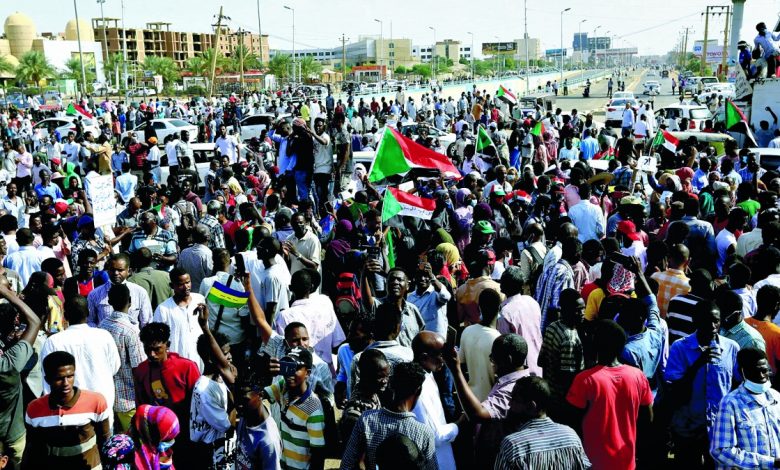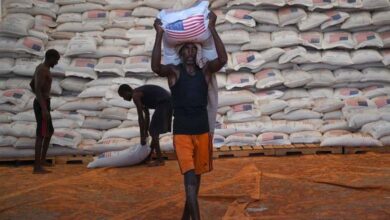Serious consequences… Conflict in Sudan spreads deadly epidemics to neighboring countries
The conflict in Sudan is spreading deadly epidemics to neighboring countries, raising serious health concerns

The World Health Organization has warned of growing health threats as the war in Sudan escalates, and millions of people flee, many of whom are sick, injured, or coming from areas where the bodies of victims lie in the streets, facilitating the spread of diseases. The situation is critical, as millions are seeking safety inside Sudan or crossing borders to neighboring countries where healthcare services are fragile and difficult to access.
Serious repercussions
The conflict, which erupted on April 15 between the Sudanese Armed Forces and the quasi-military Rapid Support Forces, has not been contained within the country and has deep regional implications.
The conflict has resulted in the displacement of approximately 3.4 million people, including 2.5 million internally displaced within Sudan. Around 760,000 people have been forced to flee as refugees to six neighboring countries, and many arrive in poor health, carrying infectious diseases and other illnesses.
The Federal Sudanese Ministry of Health has reported that at least 1,136 people have been killed and over 12,000 others injured since the start of the conflict. Nima Abid, the World Health Organization’s representative in Sudan, stated that the actual death toll is likely higher.
The health crisis resulting from the conflict in Sudan is immense, as the fragile healthcare system in Sudan is unable to handle the multiple emergencies. Two-thirds of hospitals in the affected areas are not operational and are unable to respond to the massive public health needs. This has led to the spread of various infectious diseases, which have easily transmitted to neighboring countries, particularly Chad, Eritrea, and Ethiopia.
Disease spread
The World Health Organization has documented 51 attacks on healthcare facilities since the conflict began, resulting in 10 deaths and 24 injuries, and denying urgent medical care to those in need.
Abid mentioned that all organizational activities have stopped, including vector control activities. Currently, there is a significant measles outbreak, with over 2,000 reported cases and 30 deaths.
The vaccination coverage was already low even before the war, with Blue Nile and White Nile states being the most affected. Now, there are outbreaks in nearly 10 states.
Abid expressed concern about the rise of malaria, dengue fever, and Rift Valley fever during the current rainy season. Malnutrition is considered the most serious health problem facing people in refugee camps.
Furthermore, the neighboring countries of Sudan have reported the appearance of some epidemics. Egypt confirmed cases of dengue fever in the southern provinces and took necessary measures to confront the disease and prevent its spread. Chad also reported several cases of different diseases.
Chad, which is adjacent to Sudan, hosts a quarter of a million Sudanese refugees, and the United Nations expects a similar number to arrive in the country by the end of the year. Jean Bosco Ndihokubwayo, the World Health Organization’s representative in Chad, stated that this will significantly increase healthcare needs and exert immense pressure on the available healthcare facilities.
The World Health Organization reported that approximately 2,500 people are arriving in Chad every day, many of them with severe gunshot wounds. Many others are arriving with infectious diseases, malaria, and cholera.
Ndihokubwayo expressed concern about malnutrition as the most critical health issue facing people in refugee camps. He stated, “Currently, we have over 4,000 children suffering from severe malnutrition, with 250 children admitted to the hospital. When combined with diseases like measles in malnourished children, the impact is deadly, as with other current diseases.”
Malaria Spread
The World Health Organization (WHO) has reported cases of malaria among children under the age of five, as well as suspected cases of yellow fever among approximately 17,000 Sudanese refugees who sought shelter in the Central African Republic.
The organization also mentioned suspected outbreaks of cholera among many displaced individuals in northern Ethiopia.
Majdoulin Armah, Director of Sudan’s crisis incidents at the WHO Regional Office for Africa, stated that the African region has received 65% of the Sudanese population who fled the country.
She emphasized the importance of establishing health emergency rooms across borders to ensure access to healthcare for all vulnerable population groups, stating: “We want to increase access to healthcare services by expanding the formation of emergency teams in various border areas.”
“We want to ensure that vaccination campaigns can work to mitigate the spread of epidemics,” she added, stressing the importance of humanitarian agencies obtaining funding to enable the implementation of these vital health projects.
The WHO and its partners are working to provide emergency assistance and medical supplies to people in Chad, as well as in the Central African Republic, Egypt, Ethiopia, and South Sudan, as quickly as possible.












